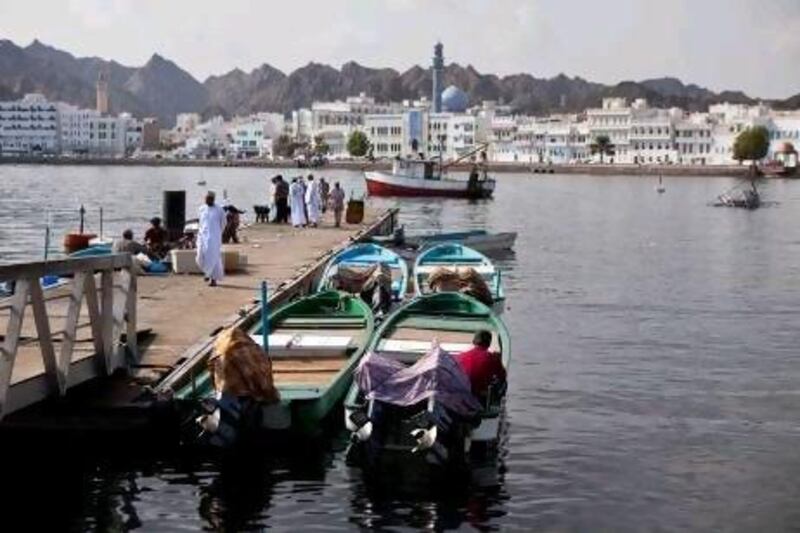Why Muscat?
As the capital of the oldest independent Arab state, Muscat can draw effortlessly on multiple influences - Arabian, Indian and, uniquely, African. As late as the 1850s, Oman controlled a trading empire that stretched from Gwadar, on the Balochistan coast of modern-day Pakistan, to Zanzibar, in what is now Tanzania.
Many Omanis retain links with both outposts, and the surprise of being able to earwig in Swahili or Balochi hints at its fascinating heterodoxy. Historical continuity bequeaths cultural self-confidence. Muscat's streets are a congenial tangle of dishdashas and shalwar kameez, with colourful embroidered kummar hats and muzzar turbans bobbing above. Few carbuncles break the low-rise skyline of whitewashed flat roofs.
Despite being declared Arab Tourism Capital 2012, the city still relies on word of mouth to draw visitors. There are no must-see attractions. Roam, eat, laze. Watch dolphins. Sniff frankincense. You won't want to leave.
A comfortable bed
Muscat's hotel scene is gappy, with not much between local business hotels and luxury tourist hideaways. Al-Waha Hotel, within the Shangri-La's Barr Al Jissah Resort & Spa, is a great choice for families. It is designed around palm-lined swimming pools that offer activities from aquatic play to treasure hunts. All 262 rooms face the sea. Doubles start at 140 Omani rials (Dh1,330) per night, including taxes and breakfast (www.shangri-la.com; 00 968 2477 6666).
In town, the Chedi takes the biscuit. A sleek hotel on a private beach, it boasts pointed arches and desert tones in the tented lobby, polished wood and artful minimalism in the Zen-like guest villas. Doubles start at RO185 (Dh1,760), including taxes and breakfast (www.ghmhotels.com, 00 968 2452 4400).
If location matters, the cheerful Crowne Plaza wins out, perched on a rocky ridge overlooking the full sweep of Qurum beach within easy reach of the centre. Gardens, epic sunset panoramas and a fine Iranian restaurant offset the humdrum interiors. Doubles start at RO95 (Dh905), including taxes and breakfast (www.crowneplaza.com; 00 968 2466 0660).
Find your feet
Hemmed in by mountains, Muscat forms a narrow ribbon stretching 30 kilometres along the coast. Head first to the harbour-front quarter of Muttrah, with its souqs and 19th-century merchants' residences overlooked by a 16th-century Portuguese fort. Follow the Corniche for 2km around a headland to reach Old Muscat, a sleepy cove dominated by twin ridgetop forts, Portuguese again. Spruce residential lanes end at the Sultan's palace, a 1970s fantasy in blue and gold by the sea wall.
Meet the locals
For Omani heritage in the raw, aim for Muttrah around sunset: stroll on the Corniche and wander the Souq Al Dhalam ("Market of Shadows"), redolent with the aromas of frankincense and greased copper. Alternatively, if you prefer Gucci to grungy, mingle with Muscat's lunching ladies at Mackenzies Deli (www.mackenziesdeli.com; 00 968 9777 6111), reopened a fortnight ago in Madinat Qaboos - now sporting Scottish thistle wallpaper and a fine menu of quiches (RO2.600; Dh25) and cappuccinos.
Book a table
Ubhar (www.ubharoman.com; 00 968 2469 9826) pioneered restaurant renderings of Omani cuisine. The classic combo is a starter of paplou (spicy seafood soup; RO2.500; Dh23) followed by a shuwaa sandwich of marinated, slow-cooked beef (RO4.700; Dh44), or you could opt for succulent camel biryani (RO5.500; Dh52) or qabouli rice with shark (RO5.700; Dh54). With contemporary styling by designers Thomas Klein, it remains one of Muscat's top culinary draws.
Kargeen Caffe (www.kargeencaffe.com; 00 968 2469 2269) is another sociable place to tuck into shuwaa (RO3.500; Dh33), though its Arabian theming - tents, lanterns, twinkly lights - quickly palls. Pleasant garden seating and a killer minted lime juice might make you linger.
Muscat's Indian restaurants excel. From an unpromising location in Ruwi's Central Business District, Woodlands (www.ashaoman.net; 00 968 2470 0192) turns out Chettinad cuisine of the highest quality such as yera varuval (stir-fried spicy prawns), RO4.500; Dh42); varutha kozhi (dry-cooked pepper chicken, RO3.600; Dh34) and iracchi masala (spiced mutton), RO4.300/Dh40). There are also lighter dosas (around RO1; Dh9) and veg dishes. Book ahead: the pink and green interior may not have changed in years, but it's packed nightly.
Shopper's paradise
Muscat's malls won't impress visitors from the UAE, but the Amouage perfume factory might. This intimate workshop in Rusayl (www.amouage.com; 00 968 2453 4800) is open daily for public visits: smooth-talking staff identify ingredients and explain the production process. Samples abound, but purchases are optional - thankfully, when 100ml can cost north of RO150 (Dh1,400).
What to avoid
Muscat's taxis are unmetered and, it seems, unregulated: don't get in without having agreed a fare. A journey between Madinat Qaboos and Muttrah might be RO3 (Dh28), or it might be RO6 (Dh56), depending on your haggling skills.
Don't miss
Head over to Ghubra for the landmark Sultan Qaboos Grand Mosque. This spectacular building's hand-woven carpet and immense chandelier get top billing, but the serenity is what resonates.
Go there
Oman Air (www.omanair.com) makes the hour-long flight from Abu Dhabi or Dubai from Dh570 return, including taxes.





